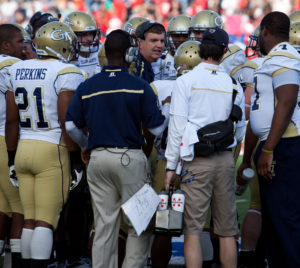
Then Judah said, “The strength of the laborers is failing, and there is so much rubbish that we are not able to build the wall.”
And our adversaries said, “They will neither know nor see anything, till we come into their midst and kill them and cause the work to cease.”
So it was, when the Jews who dwelt near them came, that they told us ten times, “From whatever place you turn, they will be upon us.”
Therefore I positioned men behind the lower parts of the wall, at the openings; and I set the people according to their families, with their swords, their spears, and their bows. And I looked, and arose and said to the nobles, to the leaders, and to the rest of the people, “Do not be afraid of them. Remember the Lord, great and awesome, and fight for your brethren, your sons, your daughters, your wives, and your houses.” (Nehemiah 4:10-14)
I was in the stands and personally watched one of the most amazing sporting events of all time — the greatest comeback in college football bowl history. It took place at the Alamo Bowl in 2016 between Oregon and Texas Christian University (TCU), both ranked in the top ten nationally. Playing with a quarterback who had never before started in a major college football game, TCU found themselves down 31-0 at halftime. Many of their fans had given up hope and had headed for the exits. Hundreds of thousands of television viewers across the country changed the channel or just turned off their televisions. However, there was one person who still believed, who still held to the hope of a comeback even when the situation looked so bleak. Coach Gary Patterson took his team into the locker room at halftime and made some proper adjustments. He changed the defensive scheme. He instilled within his team the attitude that it was never over until it was over. Then he turned to his inexperienced quarterback, Bram Kohlhausen, whose father had recently died. The coach looked into the young man’s face and said, “Your dad has passed away, but he is watching. Can you imagine if you came back? Can you come back? Can you go out there and win this football game?” By the time halftime ended, the TCU players practically broke the locker room door down, trying to get back on the field.
The result of those halftime adjustments was amazing. Oregon didn’t score again in the third or fourth quarters, and Kohlhausen led his team to tie the game 31-31 at the end of four quarters. Then, in triple overtime, he himself scored to complete the greatest comeback victory in bowl history. And all because a coach didn’t give up when he met stiff opposition but instead made some proper adjustments.
Halftime for Nehemiah
Nehemiah was something of a coach himself, and he knew it was the YAC, the yards after contact, that would determine whether his team would win or lose. So he, too, made some proper adjustments at halftime when the wall was halfway completed. He put his finger on the problem of the opposition he was facing. Some of the Jews were dwelling too near the enemy (Nehemiah 4:12). And the problem was that those from the tribe of Judah had been listening to those Jews who lived close to the enemy. The enemy was influencing them with their negativity. Being far removed from the center glow of the dynamic rebuilding spirit, they were picking up on the gossip of those who sought to discourage them. Living so near the enemy caused them to alter their focus and place their immediate attention on the enemy itself. They began to listen to the scoffers instead of listening to their God. This can happen to people who are in the process of rebuilding. They can find themselves dangerously close to those who are attempting to discourage them, and they can begin to listen to them instead of moving themselves nearer to the center of where God is rebuilding.
Rubbish

One of Judah’s primary concerns and complaints was that there was “So much rubbish” (4:10). There was nothing wrong with the actual foundation upon which Nehemiah and his team were rebuilding their wall. It was rock-solid. The problem existed because, for years, all types of junk and debris had accumulated on top of that foundation. Any attempt to rebuild the wall without first removing the rubbish would have been frustrating and futile. Oh, they may have gotten the wall up, and it may have even looked really good, but the first big assault of any kind would have brought it tumbling down once again. It is always dangerous to attempt to rebuild a wall on a foundation as unstable as rubbish. Yet, there are many who attempt this today, especially when it comes to trying to rebuild a relationship. Relational rubbish has a way of accumulating untouched over the years. To not remove it and to attempt to build again on top of it only assures that, in a short time, that relationship will crumble again. Relational rubbish can only be removed through true repentance and unconditional forgiveness.
Many of us who are in need of rebuilding already have a solid foundation. We do not need to lay a new one. But we do need to remove our own accumulated rubbish so the solid foundation can be exposed once again. Many marriages have been built on a solid foundation, but it is the rubbish that has been allowed to pile up across the years that is the problem. We need to remove it, to get back to the foundation, and to make our own proper adjustments when we meet our opposition.
Others of us are living lives that were originally built on a solid foundation. We were brought up on the principles of honor, decency and integrity that are rooted in the Bible. The problem lies in the fact that those principles have not been seen in a while because all the rubbish of life has buried them. And unfortunately, some of us continue to attempt to build on that rubbish instead of first removing it. This perpetuates an endless cycle of rebuilding and collapse, and it is a major reason why more walls of life are not solidly and permanently rebuilt.
When Nehemiah met with opposition, he first faced it head-on, and then he made the proper adjustments needed to complete the task. Listen to him, like a motivating coach at halftime, as he regrouped his troops: “Do not be afraid of them. Remember the Lord, great and awesome, and fight for your brethren, your sons, your daughters, your wives, and your houses” (4:14).
The Proper Adjustments
It was halftime for Nehemiah, and the wall was at half its height (4:6). It was time to make the proper adjustments to the game plan. Nehemiah called all his people off the wall, rallied them together, huddled them up, gave them an inspiring challenge, and then sent them out to get rid of the rubbish and finish strong. Like a seasoned coach of a championship team, he made the necessary halftime adjustments. There was a rebuke — “Do not be afraid of them.” He addressed their fears and encouraged them — “Remember the Lord, great and awesome.” Then he exhorted them — “Fight for your brethren.”
Are any of us wondering why we rebuild only to see our walls crumble again time after time? Could it be that we are attempting to rebuild on a foundation as shiftless as rubble? Remember, it is the YAC that matters. And sometimes, opposition comes in the form of debris that first needs to be removed. As we remove that debris — through personal repentance and unconditional forgiveness — and as we continue moving forward to ward our goal, we will become more and more convinced of the fact that… it’s never too late for a new beginning.
Taken from The Nehemiah Code by O.S. Hawkins. Copyright © 2018 by Dr. O.S. Hawkins. Used by permission of Thomas Nelson
O.S. Hawkins is the chancellor of Southwestern Baptist Theological Seminary. He has served pastorates, including the First Baptist Church in Fort Lauderdale, Florida, and the First Baptist Church in Dallas, Texas, for more than 25 years. A native of Fort Worth, Texas, he has a BBA from Texas Christian University and his MDiv and Ph.D. from Southwestern Baptist Theological Seminary. For almost a quarter of a century, he served as president of GuideStone Financial Resources, with assets under management of $20 billion, serving 250,000 pastors, church staff members, missionaries, doctors, university professors, and other workers in various Christian organizations with their investment, retirement and benefit service needs. He is the author of more than 40 books and regularly speaks to business groups and churches nationwide. All of the author’s royalties and proceeds from the Code series support Mission:Dignity. You can learn more about Mission:Dignity by visiting MissionDignity.org.
Read more articles by Dr. O.S. Hawkins at: https://www.goodnewsfl.org/author/o-s-hawkins/

Comments